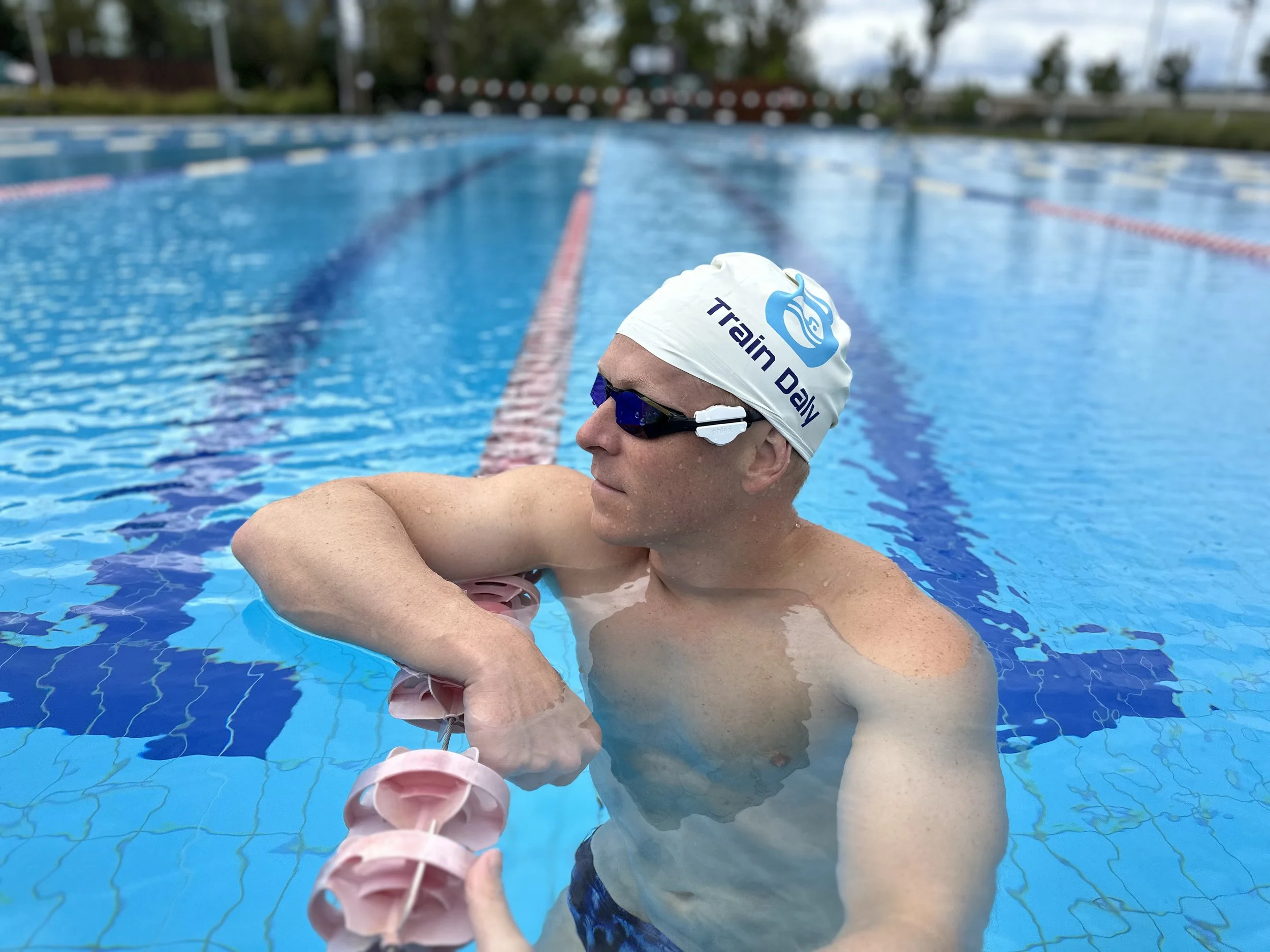Hydration for Swimmers: Can Water Boost Muscle Growth?
/As someone who's spent decades on pool decks across America, I've heard just about every question imaginable from swimmers looking to improve their performance. But there's one question that keeps surfacing lately in my coaching sessions: "Coach Dan, does water actually help build muscle?"
The short answer? Absolutely. But as with everything in swimming and strength training, there's much more beneath the surface.
The Forgotten Foundation of Muscle Development
When I first started coaching elite swimmers back in the early 2000s, I was obsessed with perfect technique, innovative training sets, and cutting-edge strength programs. Don't get me wrong – those elements are crucial. But I've learned through years of coaching that we often overlook the fundamentals, and hydration might be the most underappreciated performance factor of all.
I remember working with a talented college sprinter who couldn't break through his plateau despite perfect attendance and giving 100% effort in every workout. His weight room numbers were impressive, but his pool performance had stalled. The breakthrough came when we tracked his hydration levels and discovered he was consistently training in a dehydrated state. Within three weeks of correcting his hydration strategy, his 50 free dropped by four-tenths – a massive improvement at his level.
Why? Because water isn't just something we swim in – it's the essential medium for every physiological process that builds and maintains muscle.
Liquid Gains: The Hidden Muscle-Building Power in Your Water Bottle
In my training approach, I emphasize that muscle development happens through a continuous cycle of stress, recovery, and adaptation. Water plays a critical role in every stage of this process.
swimmers drinking water from bottles after training
When you're properly hydrated:
Nutrient Transport Improves: Your blood volume increases, allowing for more efficient delivery of protein, amino acids, and other muscle-building nutrients to working muscles.
Cellular Volumization Occurs: Scientific research shows that hydrated muscle cells are more anabolic (muscle-building) than dehydrated ones. This "cell swelling" effect creates an environment where protein synthesis is enhanced.
Recovery Accelerates: Water supports the removal of metabolic waste products after intense training. Less waste accumulation means faster recovery and, ultimately, more consistent training.
During a recent training camp with Olympic hopefuls, I implemented hydration testing alongside our regular performance metrics. The correlation was undeniable – athletes maintaining optimal hydration levels consistently recovered faster between sessions and showed greater strength gains over the three-week camp.
Why Swimmers Face Unique Hydration Challenges
Here's something you might not realize: just because you're surrounded by water doesn't mean you're hydrated. In fact, the swimming environment creates several hydration hurdles:
Invisible Sweating: I've had countless swimmers tell me, "Coach, I don't sweat in the pool." This misconception is dangerous. You're actually sweating significantly during intense swimming – you just don't notice it because you're already wet.
Temperature Regulation: Pool environments, especially indoor ones, create unique thermoregulatory challenges. Your body uses water to maintain core temperature, depleting reserves faster than many swimmers realize.
Limited Drinking Opportunities: Unlike runners or team sport athletes, swimmers have fewer natural breaks to hydrate during training sessions.
In my Advanced Swimming Performance System, I've integrated mandatory hydration breaks into training sessions after seeing the profound impact they have on training quality and recovery.
Personal Hydration Baseline
Water and Muscle Protein Synthesis: The Direct Connection
Does drinking water directly build muscle? This is where we need to be precise with our understanding.
Water itself doesn't contain the building blocks for muscle (that's where protein comes in), but it creates the optimal environment for muscle protein synthesis – the process that actually builds new muscle tissue.
When I work with my competitive swimmers on strength development, I emphasize that proper hydration:
Maintains ideal blood flow to working muscles
Supports optimal hormone levels necessary for growth
Enhances the body's ability to use dietary protein for muscle repair
Reduces exercise-induced muscle damage
Improves training capacity and recovery
I've observed this firsthand with the swimmers I coach. Those who maintain consistent hydration routines show measurably better responses to strength training programs than their less-hydrated teammates, even when following identical workout plans.
Implementing a Swimmer's Hydration Strategy for Muscle Growth
Knowledge without action won't add a single fiber to your muscles. Here's my practical, four-step approach to optimizing hydration for muscle development:
Step 1: Calculate Your Personal Hydration Baseline
Start with this simple formula I use with all my athletes:
Take your body weight in pounds, divide by 2, and drink that many ounces of water daily as your minimum baseline.
For example, a 160-pound swimmer should consume at least 80 ounces (about 2.4 liters) of water daily – and that's before accounting for training needs.
Step 2: Develop Your Training Hydration Protocol
For every hour of swimming:
Drink 16-20 oz (473-591 ml) of water in the hour before training
Consume 7-10 oz (207-296 ml) every 20 minutes during training
Replenish with 16-24 oz (473-710 ml) for every pound lost during the session
I have my swimmers weigh themselves before and after key training sessions to determine their sweat rate. This creates awareness and personalization that makes a dramatic difference.
Step 3: Enhance Water's Effectiveness with Strategic Timing
Water consumption isn't just about quantity – timing matters tremendously for muscle development:
Morning Hydration: I instruct all my swimmers to drink 16-20 oz (473-591 ml) of water immediately upon waking to rehydrate after overnight losses.
Pre-Workout Timing: Consume 16-20 oz (473-591 ml) of water 60-90 minutes before training to ensure optimal hydration without excessive bathroom breaks during the session.
Post-Workout Window: Drink 24 oz (710 ml) within 30 minutes after training to support the recovery process when your muscles are most receptive.
Step 4: Monitor Hydration Status Daily
My swimmers use these simple indicators to assess their hydration:
Urine Color: Aim for light straw to transparent yellow (like lemonade, not apple juice)
Thirst Levels: Feeling thirsty means you're already dehydrated
Weight Fluctuations: Sudden weight drops of 1-2% indicate dehydration
Energy Consistency: Significant energy dips often signal hydration issues
In my optimal performance system, we track these metrics daily alongside training performance to identify patterns and make adjustments.
Beyond Plain Water: Strategic Hydration for Serious Swimmers
While plain water forms the foundation of hydration, swimmers in serious training should consider these strategic additions:
Electrolyte Supplementation: For sessions longer than 60 minutes, I recommend adding electrolytes to maintain cellular hydration and prevent cramping. The sodium-potassium balance is particularly crucial for maintaining muscle function.
Intra-Workout Carbohydrates: For training sessions exceeding 90 minutes, adding a small amount of carbohydrate (around 6-8% concentration) to your water can help maintain blood glucose levels and preserve muscle glycogen – both essential for optimal training intensity and preventing catabolism (muscle breakdown).
Protein-Enhanced Hydration: Emerging research supports adding a small amount of protein (around 10-15g) to post-workout hydration to jumpstart the recovery process while rehydrating.
I've seen remarkable improvements in both training quality and muscle development since implementing these strategies with my elite swimmers. The combination of proper hydration timing, adequate volume, and strategic supplementation creates a physiological environment where muscle growth can flourish.
The Coach Dan Approach: Hydration as a Competitive Advantage
In my Functional Swimming system, I treat hydration not as an afterthought but as a cornerstone of athletic development. I believe proper hydration is one of the few "free" performance enhancers available to swimmers of all levels.
I regularly tell my athletes: "You can have the perfect training program, the best nutrition plan, and genetic gifts – but if you're chronically dehydrated, you'll never reach your potential."
The swimmers who embrace this philosophy consistently show:
Greater training capacity
Faster recovery between sets and sessions
More consistent strength progression
Better body composition changes
Improved technical execution, especially late in workouts
These benefits compound over time, creating a significant competitive advantage.
Water as Your Most Important Supplement for Muscle Growth
After decades of coaching swimmers at every level, I'm convinced that proper hydration might be the most underutilized tool for enhancing muscle development and overall performance.
Before you invest in expensive supplements or fancy training programs, master your hydration strategy. It's the foundation upon which all other aspects of performance are built.
Remember my coaching mantra: "Excellence lives in the fundamentals." And nothing is more fundamental to swimming performance and muscle development than water – both in and out of the pool.
Stay hydrated, swim strong, and watch your performance transform.
Coach Dan Daly, CSCS




